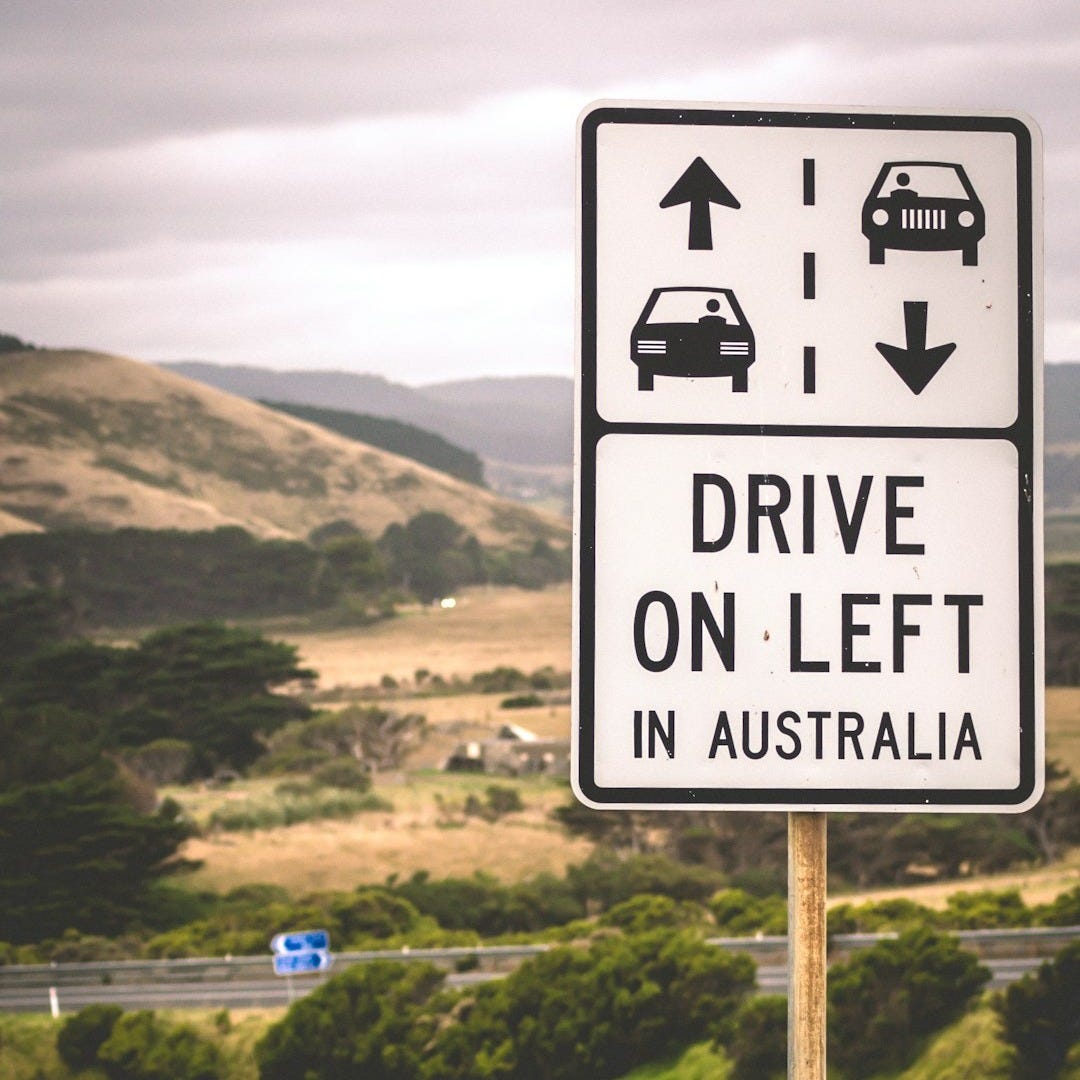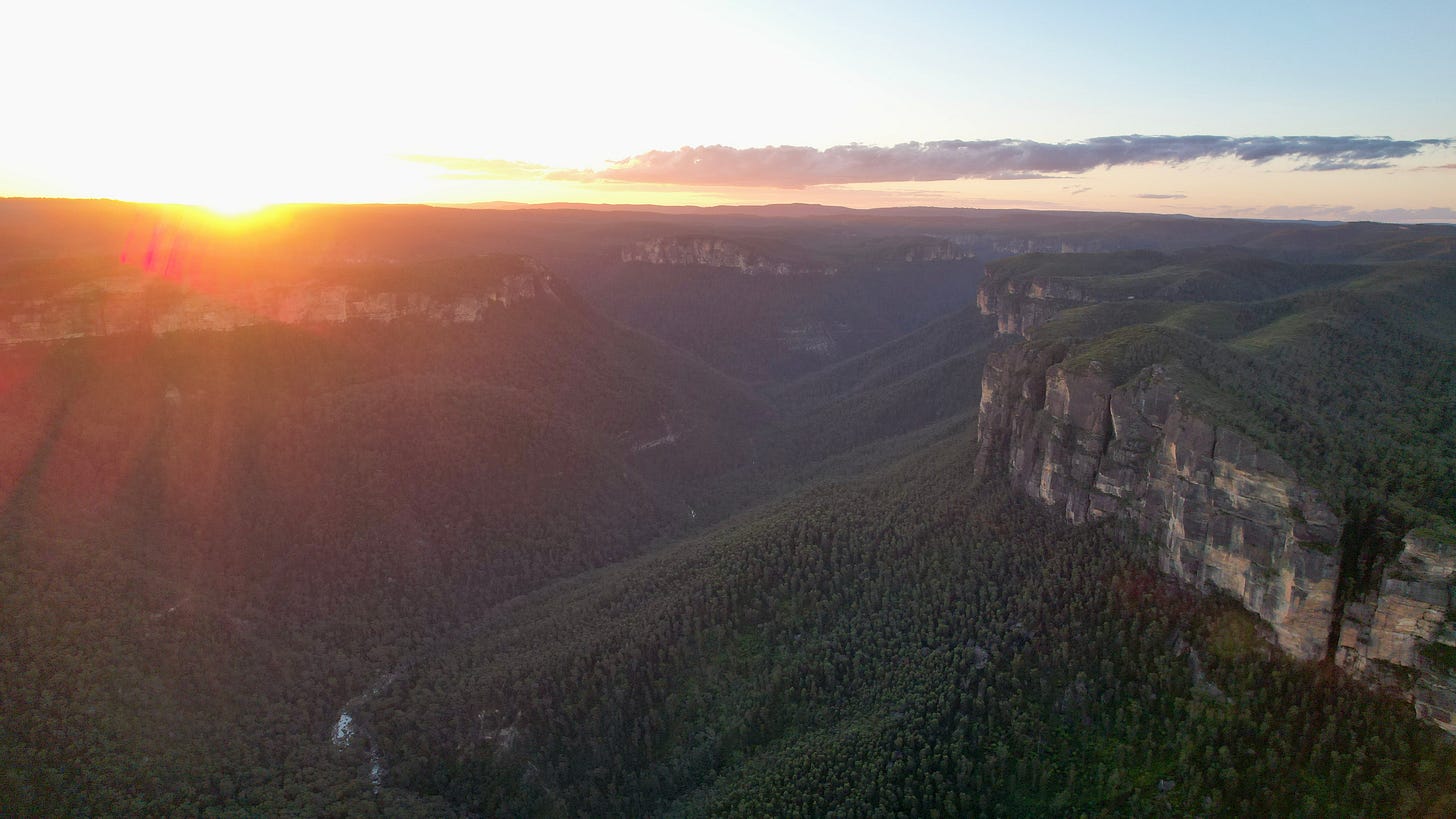Australia is just a slighty more British version of America, so why are we so hesitant to go?
Quietly, the electric bus hissed off the curb and down the terminal road connecting international arrivals with domestic departures. I had landed in Brisbane, Queensland, after almost five months in Latin America. The immediate difference in culture could not have been more obvious.
Back in Bolivia, imported buses still with Chinese characters painted on the side, belch black smoke onto the street as they lurch and roar into the quagmire that is city traffic in those parts. Mobile phones ring, social media videos blare at full volume, there are smells, and personal space doesn’t exist. Throwing it out of an open window is how you get rid of your litter. Sometimes, drivers stop for a red light, but usually not. Always, they are in a rush. The honking is ceaseless.
My first moments in Australia were on a quiet electric bus driven by a man with a gentle foot on the brake. The passengers spread out among the many seats and kept the silence for the fifteen-minute ride. It couldn’t have been more different than the place I had just left. People here can be trusted to have nice things.

Like healthcare. They are a healthy people and pay collectively for each other to stay that way. While medical debt is the leading cause of bankruptcy in the United States1, Australians will never have to consider a second mortgage to pay for surgery. It’s covered.
Cigarettes are fifty bucks a pack and come in plain packaging to deter smoking instead of the candy-colored boxes American convenience stores push. Alcohol is also a prohibitively expensive habit. Tanning beds are outlawed, and sunscreen is subsidized in a (effective) scheme to lower the national skin cancer rates.2
Prescription drug advertising is forbidden.3 Even goth teenagers wear bike helmets. Trails are packed with joggers every morning, and the bicycle culture is over the top. Some health plans even pay for a gym membership.
I saw nothing like the obesity epidemic weighing down my own country. Most people live near the coast, and they are constantly surfing. The air is fresh, the climate is agreeable. Every food has a health rating on it. (Candy gets a half star, vegetables get five.)

The sports are more exciting too. First, I have to acknowledge that Australians waste ages on the mind-numbingly boring game of cricket, and that can be forgiven. It is the British side of them. American baseball is also boring to watch but like cricket is more cultural than athletic. So baseball and cricket cancel each other out, but Australians have something better than American football.
Rugby League moves faster, with fewer stoppages, fewer penalty calls, more action, and a closer relationship between fans and athletes.
Players run the ball forward or pass it to a player behind who keeps it moving. They don’t pass forward. The third way they move the ball is to kick it along the ground and compete to recover it upfield before the opponent does.
There’s more speed, movement, and action than American Football, which throws forward, runs forward, kicks forward, or, in most plays, clashes with the defense and goes nowhere at all.
American football stops after every tackle, and the players mill around waiting to line up for the next play. Rugby players, after they’ve been pinned for three seconds in a tackle, relinquish the ball to a player behind them, and the game is immediately underway. The ball stays in motion with fewer whistles and yellow flags to slow it down, and the fans stay rowdy.

It is objectively more fun to be a spectator in the rugby oval than in the football stadium. The stands are smaller, so it’s impossible to be far away from the field. Tickets are cheaper, so each team’s devoted following doesn’t have to break the bank to attend regularly.
Rugby players don’t wear pads or helmets so fans can see all their features. It also forces more natural tackling methods that looks like something closer to wrestling than the concussion-inducing car accidents on the gridiron.
Rugby players hold some renown in their communities and clubs, but not the celebrity and inaccessibility of the NFL and (increasingly) university footballers. Rugby players stay after every footie (that’s what they call a match) to meet the fans and sign autographs, no VIP ticket required.
It seems like football with better rules.
The plants and animals have a trace of that familiar characteristic as well. Strange, but not totally foreign.
They’re just different enough that I find myself looking at them like pictures in a magazine, where I am trying to spot the difference.
The birds in the states are like choirboys, but here they are metalheads. The sound at first sounds like screeching and screaming but I got used to it like getting used to a different radio station. Then I learned to like it. My favorite is the kookaburra. Their call is a laugh, but with a little imagination, I can picture monkeys making the same sound, and it’s cool to me that such a bird exists in such abundance.4
If released into the skies above America, most Australian birds would pass for colorful crows or escaped parrots.
Kangaroos are the exception. The longer you look at them, the more they look like a humanoid deer. They stand up a fair bit and have arms like people do to scratch themselves, looking very much like people. I look at their faces when they are down on all fours eating grass, and they look like deer.

Everywhere else in the world, marsupials were out-competed by placental mammals that dominate the landscape today. Australia’s wildlife carries its young in a pouch, and it’s this feature that makes them the most enduring to foreign visitors like me.
Kangaroos, Koalas, opossums, Wallabies, and other pouch-wearing marsupials are the largest of the land-based wildlife down here in British America.
The plants are a different shade of green, but the trees bear fruits familiar to Americans. The hardwoods have combustible oil and regenerative bark. They shed and regrow it like a snake coming into its new skin, and the castings gather in heaps around their roots. It’s fun spotting the differences, and there’s parkland everywhere to go on bushwalks and try and find more for oneself.

So why aren’t Americans flocking to come and see this place?
It’s somewhere far behind South Korea, not even in the top ten or mentioned in the top twenty as a place for American travelers to go.5
There is plenty of space down here. It’s a top ten or even top three reason that Australia is so nice. Despite having roughly the same land mass as the contiguous United States, it has a population smaller than Texas.6 Granted, the outback is uninhabitable, but vast tracts of land around the perimeter are wide open bush with moderate climate, coastal access, or even mountains.
Even if people came down to Australia and didn’t want to stay in the countryside, it also has world-class, well policed, and clean cities. Americans would find it a relief to go to an English-speaking city where the streets are swept and people are happy and friendly, instead of what we’ve let our cities come to, which (sadly) is drug addicts and mental patients released onto the street to fend for themselves.
Go visit downtown in Australia, and there’s nothing to be afraid or ashamed of. They are healthy, well-policed, clean environments with public transportation and the feeling that you don’t have to have your guard up.
Australians like keeping their country’s land open, without the overcrowding or mass migration of Europe or America.
Their geography makes it harder to show up illegally. People still migrate here, of course, mostly Asians and Pacific Islanders who bring a more responsible culture instilled by their home countries instead of the mixed bag of somewhat apathetic Latin Americans we get in the United States.
And that’s coming from me, someone who loves Latin America so much I spent five months in four countries learning the language and culture. I hate to admit this, but the values coming with the migrants to Australia are more conducive to a cooperative society than the ways of South and Central Americans.
How many people enter is naturally limited in Australia because of the ocean moat around it. How many people get into the United States seems more dependent on who is guarding the fence. (I passed easily through the fence in 2024 from Mexico to Arizona, but tension is high again and the guards are back, so I wouldn’t try it today.)
What I’m saying is that in Australia, there’s plenty of space, but they’re not in a rush to fill it.
So why aren’t Americans going to the slightly more British version of their own country? To most, it would feel more familiar than Alaska or Hawaii.
I think Australians are sabotaging their own image to preserve their space and sustainable migration habits by putting out a scary persona to keep people away.
Don’t laugh. Australia’s misinformation campaign against itself is working!
Tell your American friends you went to Australia, and most will gasp, lean across the table, look over their glasses, and in a tone of concern, ask one of the following questions.
Did you get punched by a kangaroo?
Don’t they have crocodiles that eat people?
But isn’t it too hot to live there?
Was the jetlag awful?
Did you get bit by a spider? Scorpion? Shark? Jellyfish? Stingray? Octopus? Snake?
Was there a cyclone while you were there? A Heatwave?
Did you die?
‘Yes. I went to Australia and died a painful death. That is why I came back here, where it is safe.’
They’re terrified, that’s why they don’t go.
I’m not saying I’m rushing to move there or telling other people to start their work visa applications, but I would like people to give the place a fair shake instead of imagining what animal will attack them if their judgment ever lapsed so poorly as to book a trip.
Australia is an alternate reality where the United States talked things out with the British and got independence over a handshake instead of a war. They even kept the Union Jack in a little corner of their flag and monarchs on their coins.
It’s where ranch hands do the same job but, on a motorbike, and are called jackaroos instead of cowboys. The accent is happy and enduring instead of condescending (British) or blunt (American) accents. A sleepy Koala is the closest you’ll get to a deadly grizzly bear. And speeding fines are assessed remotely by camera and delivered in the mail, instead of their severity depending on the shifting moods and quotas of a police officer with a gun.
Australians are more chill. They take more vacation days and don’t work at a burnout pace. They’ve even shortened most words: afternoon is arvo, university is uni, breakfast is brekie, and it’s not an accident. It’s relaxed. There’s a correlation between culture and language.
Americans greet each other with “How you doing?” which assumes that who they are greeting is doing something and the asker wants to know how they’re doing it.
Australians say “How ya going?” which implies that one doesn’t need to be doing anything at all. It’s casual. It’s taking a nap in a hammock. It’s surfing instead of scrolling, and it’s working things out with Britain over cheese and bickies instead of bullets and warships.
All I’m saying is don’t buy the misinformaiton those people are spreading about themselves. The place is lovely. Granted, a platapus looks like a rough draft of an animal and every once in a while a shark bites off someone’s foot, but it’s no reason to stay home.
Americans need to check it out for themselves.
Bedayn, Jesse. “States Confront Medical Debt That’s Bankrupting Millions.” AP News, AP News, 17 Apr. 2023, apnews.com/article/medical-debt-legislation-2a4f2fab7e2c58a68ac4541b8309c7aa.
Howe, Megan. “The Economics of Skin Cancer Prevention with Implications for Australia and New Zealand: Where Are We Now? - March 2022, Volume 32, Issue 1.” PHRP, Public Health Research & Practice, 9 Mar. 2022, www.phrp.com.au/issues/march-2022-volume-32-issue-1/skin-cancer-economics/.
Vitry, Agnes. “Is Australia Free from Direct-to-Customer Advertising?” Australian Prescriber, Independent Review, 1 Feb. 2004, australianprescriber.tg.org.au/articles/is-australia-free-from-direct-to-customer-advertising.html.
Wood, Drew. “These Countries Are Americans’ Favorite Vacation Destinations.” 24/7 Wall St., 15 Sept. 2024, 247wallst.com/travel/2024/09/15/these-countries-are-americans-favorite-vacation-destinations/?utm_source=chatgpt.com.
Contributing Editors. “Australia Population (2025).” Worldometer, 1 July 2025, www.worldometers.info/world-population/australia-population/.




You've captured so much of Aussie culture in your writing and little quirks I hadn't noticed myself as an Aussie! So glad you had a chance to see the footy game and a bonus that the right team won! Beautifully written, thanks for sharing.
I always feel I am on the adventure or trail with you!! Your Fan Grandmother